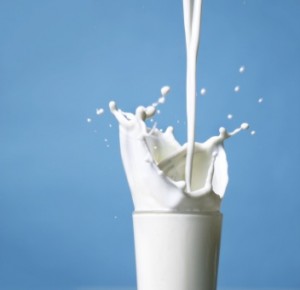 Nutrition expert Alan Aragon, who’s responding to claims that milk isn’t good for you. Alan is what I call a common sense nutritionist. He combines science and the real-world experience of his clients to create his recommendations, and also takes every case individually. Here, he tackles the arguments that “milk doesn’t contribute to bone health,” and that “we shouldn’t be drinking it because it comes from another species.”
Nutrition expert Alan Aragon, who’s responding to claims that milk isn’t good for you. Alan is what I call a common sense nutritionist. He combines science and the real-world experience of his clients to create his recommendations, and also takes every case individually. Here, he tackles the arguments that “milk doesn’t contribute to bone health,” and that “we shouldn’t be drinking it because it comes from another species.”
Argument #1: If milk is so great, why is it that America has such a high rate of osteoperosis?
There are many factors. Osteoporosis is a multi-factorial disease. Implying that milk consumption has failed to eradicate osteoporosis in the US is like saying fruit and vegetables consumption has failed to eradicate cancer. Shouldn’t eating your five-a-day “save it?” Not necessarily, but it can certainly hedge your bets against it–IF and only if a host other beneficial lifestyle habits are maintained. There’s always a mix of genetic and environmental factors that interplay in the manifestation of diseases like osteoporosis.
It’s commonly thought that a high protein intake contributes to osteoporosis as well, but can we sit here and blame protein consumption?
Let me add a little wrinkle here for you to chew on: calcium and protein work synergistically to strengthen bones. It’s not a matter of calcium being ineffective, it’s a matter of making sure its cofactors and synergists are present in adequate amounts in the diet. Adequate amounts of cofactors & synergists, sad to say, is not a common characteristic of the American diet. No wonder population studies give mixed results.
Correlation does not equal causation.
Something that needs to be cleared up here is this… If you’re gonna mention population research to support an anti-milk stance, consider the inherent lack of control of the universe of variables involved. There’s a nearly infinite set of monkey wrenches (or “confounders” as scientists call them) that makes the epidemiological data roughly an even split between saying milk is good for bone health and milk does nothing at all.
Research
However, the story changes drastically when you look at randomized controlled trials (RCTs). All types of research have their strengths and weaknesses. Epidemiological research is an attempt to spot potential correlations amidst an ocean of variables. In contrast, experimental research in the form of RCTs attempts to suppress the possibility of all other variables messing with the determination of two variables: the cause, and the effect. In contrast to the mixed bag of population data, nearly 100% of the RCTs on milk intake and bone health show a positive effect. Same story with calcium’s positive effect on bone.
Funding bias?
And then comes the question of funding source. Are Dairy Council dollars really that good at keeping the overwhelming majority of RCTs in favor of milk for improving bone integrity? If it were true, then we’d at least see a reasonable set of independently-funded experimental data consistently showing that the Dairy Council is wrong. Too bad it doesn’t exist. And keep in mind that the dairy industry doesn’t have its political talons sunk into every peer-reviewed journal, so there’s actually plenty of room for opposing results if they indeed could be derived without the bias. You would think that after decades of bitching over industry bias, staunch anti-milk groups would be able to pool together the resources to spawn at least a small handful well-controlled experimental trials that consistently support their agenda and amusing position that milk does not do the human skeleton good. Nope, hasn’t happened.
Argument #2: Milk (or cow babyfood) has a different composition compared to human milk. Different nutirents for different species.
Hypocrisy versus individual tolerance. I love it when I hear folks say that human adults weren’t meant to consume milk, much less the milk derived from a different animal species. Are you kidding me? So who gets to decide which parts of the cow we should consume? Let me get this straight–we can eat the cow’s muscles, but not the milk that laid the foundation for the growth of those same muscles? Huh? The logic is just too rock-solid for me. Folks who carry the torch against milk consumption typically will have some degree of allergy or digestive intolerance to it, and they take the liberty to project their personal problems onto the world around them. Many of these same “health-minded” people consume whey protein by the tubload –and this is not only a milk product, but an engineered refined milk product to boot. I suggest you raise a salute to cow’s teats the next time you flex your muscles, and let the rest of us enjoy our milk in peace.
Interviewee: Alan Aragon
Website: http://www.alanaragon.com/










